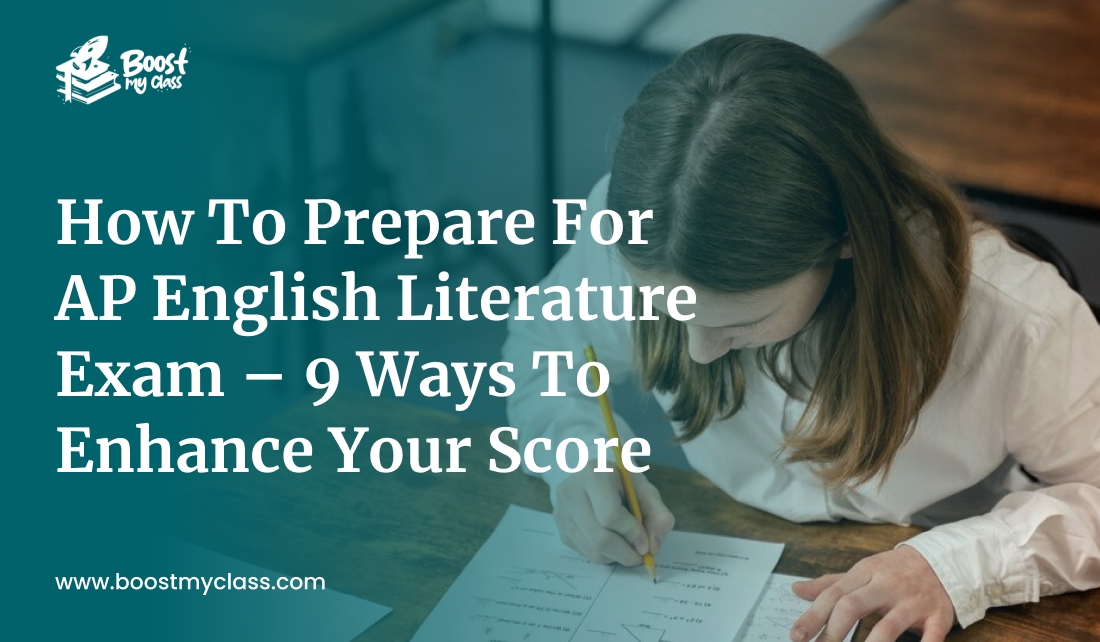How to Prepare for AP English Literature Exam – 9 Ways to Enhance Your Score

If you are planning to take AP English Literature exam, then This guide is what you need. In this latest post, we will answer some important points about AP English Literature exam, like:
- How much minimum score is required to pass the exams?
- What is the weightage of all the Sections in the AP English exam?
- How to set up an effective study plan for AP Exam
- How to write an essay for an AP exam and many more!
If you want details, you’re at the right place. So without wasting a moment, let’s get started!
Key Takeaway
- Minimum score to pass the AP English Literature exam is 3.
- Mention proper guide for all students to pass AP English exam.
- 3 mains prose, poetry, and grammar need your attention.
- Essay is all about reading, vocabulary, and conciseness.
Table of Contents
How To Prepare For AP English Literature Exam: 9 Steps To Score 4s And 5s
AP English Literature Exam consists of a 45% Multiple Choice Questions (MCQs) section and a 55% Free Response Review (FRQs) section, With cohesive tips you would be able to score 4s and 5s in your AP exams.
150+ ![]()
Qualified Tutors
1) Read Thomas C. Foster’s How To Read Literature Like A Professor
The book “How to Read Literature Like a Professor” by Thomas C. Foster tries to provide readers with the skills and strategies necessary to find hidden symbols, meanings, and patterns in literary works. It will help you better understand our services like Take My Exam For Me.
Short Introduction of Writer
Thomas C. Foster, an English literature professor at the University of Michigan, offers unique insights into the discipline of literary interpretation while making it approachable to both students and casual readers.
2) Finish All Of Your Summer Assignments
Your instructors may have assigned you some books or some writing works in your starting days. Make sure you add those assigned works to your to-do list and finish them first to have the basics of the AP curriculum.
3) Make Specific Goals
Set measurable objectives for your study plan. Having defined goals will keep you motivated and on track, whether you’re trying to master particular literary techniques or develop your essay-writing abilities.
4) Organize Your Study Time
Make small study sessions out of your time. Give yourself time to read the given books, go over the lecture notes, practice the multiple-choice questions, and write essays. Stick to your timetable religiously since consistency is important.
- Pro tip: Use the Pomodoro method to overcome your anxiety during reading or learning.
Pomodoro Method is a time management method for students to stretch 25 minutes of studies with 5 minutes of break. With this technique, you can feel less stressed and stay connected to your studies.
5) Keep Resources Of High-quality
Assemble materials that match the format and content for Take My Online Class For Me . Look for reliable textbooks, university courses, study aids, and test prep materials online. Students taking AP English Literature can find helpful information on the AP College Board’s official website.
6) Activate Your Reading Skills
Read the prescribed texts attentively and interact with the content. Make notes, highlight important passages, and make notes of any observations or inquiries. Your comprehension and critical thinking abilities will improve as a result of this activity.
7) Add Literary Criticism Books To Your Backpack
Keep these two books in your Collection for learning English literature:
- The Western Canon by Harold Bloom
- Literary Theory: A Very Short Introduction by Jonathan Culler.
These two books help study the history of English literature and its analysis.
8) Ask Teachers If Seeking Help
Don’t neglect your most valuable resource, YOUR TEACHER. If you have any issues with preparation, they will provide you with proper guidance.
Ask for their feedback while you’re also writing an essay or assignment. Their feedback will help you refine your literature skills.
9) Form A Study Group
Group study encourages students to learn things more creatively. Results have proven that those who are part of group studies are more confident and comfortable about achieving their goal.
Make a group of 3 to 4 members, truly committed to their goals. You can also arrange this group online to discuss any questions.
Try Different Learning Styles (A Quick Recap)
Variety is the key! Every Student has their reading, writing, and listening capabilities. Always try different learning styles. It is not necessary to execute all the above-mentioned tips simultaneously.
Make a proper schedule to execute these plans and follow it religiously. On day one you read a book, on another day you use flashcards to create a Q&A session, and on another day you discuss issues in the group study.
How Much Minimum Score Is Required To Pass AP English Literature Exam
Minimum Score required to pass the AP English Literature Exam is 3 on a scale of 1-5.
5 Means a perfect score and if anyone gets a score of 1 or 2 it’s not considered a good score, they should read this guide thoroughly to score points higher than 3 in the future.
Need assistance with your Online Literature Exam? Simply reach out to us.
150+ ![]()
Qualified Tutors
AP English Literature Exams Results For 2023
In 2023, More than 40,000 Students enrolled for the particular AP exam. The total Passing Percentage out of 40,000 was 56%. Complete results are segregated in the table below:
| AP English Literature Exam Results 2023 | ||
| Score | Number Of Students | Percentage(of total Students) |
| 1 | 6,000 | 15% |
| 2 | 11,600 | 29% |
| 3 | 10,400 | 26% |
| 4 | 8,000 | 20% |
| 5 | 4,000 | 10% |
7 Useful Tips to Ace in Section I (MCQs)

Multiple Choice Questions (MCQs) hold a weightage of 45% of the whole exam. It is necessary to answer them correctly otherwise a complete number would be deducted.
I’m going to mention 7 key tips that will help you score better in this section:
1) Begin With A Multiple-Choice Strategy
Reading a question first is more effective than reading the passage. You might be thinking about its possibility but this is the correct way of finding answers, but it may be distracting for some.
Reading the passage after question makes it easy for you to understand the context and helps you step out of marking the wrong answer.
You can also read the passage first and then the questions. This is a traditional approach to answering MCQs. It is important to take some mock exams and check which strategy works better for you.
2) Eliminate Incorrect Answers First
If you’re familiar with the subject matter, then it should be easy for you to eliminate the incorrect answers.
Marking incorrect answers makes it easy to focus more on correct ones and makes MCQs more manageable.
3) Pay Attention To The Time
Management of time can be done properly by practicing and studying past papers. Analyze the whole passage in a short time to make.
You are only granted 60 minutes to complete 55 questions of the MCQs section. It is important to utilize your time keenly and stop wasting it for thinking.
4) Formulate Summaries Of Passages
As you read, scribble down a few bullet points in the margins of the page beside the paragraph explaining the story progression. When answering questions, you can refer back to your notes rather than searching the full text. Consider this technique to be a treasure map of the route, a guide that will direct you to the buried riches.
5) Keep Anxiety And Stress Away
Yes, it’s true that AP exams are hard, and yes it’s also a fact that it has an impact on the amount of college credit you obtain after graduating from high school. Eventually, you should take deep breaths during the exam to keep your body calm and mind fresh.
6) Stay Alert With “None Of Above” And “All Of Above”
Sometimes there are some MCQs with “All of Above” or “None of Above”, These types of questions are tricky, even one option can create a doubt. Always be confident about your answer, you can pass through this tricky part easily.
7) Practice Multiple Exams
Repeatedly practicing from past papers, making proper notes, and jotting down key points out of every paragraph, this is how you can make your preparation much more precise. Your time management will be much better, your concepts will be much clearer.
Need assistance with your Online English Class? Simply reach out to us.
150+ ![]()
Qualified Tutors
9 Useful Tips to Ace in Section II (FRQs)

Free Response Review Questions (FRQs) are included in the second section and have a weightage of 55% of the total Exam Score.
Unlike MCQs, Free Response Review Questions are a more challenging part of the exam and it requires more writing and analytical skills.
You have to answer three questions by writing a descriptive essay. The first 2 Questions are about Poetic and Prose and the third question is about Thematic Drama.
Section II seems to be hard but Follow these tips it will be all easy.
1) Clearly Understand And Mark Up The Questions
This session includes some lengthy questions and it may take more time to understand the whole plot of the given question.
Make sure you create a whole story in your mind in a snap and make outlines of possible essay topics using your course materials so you know you’ve got a good grasp of what might be on the test.
Regurgitating the question will show you that you may not be confident in your ability to dissect passages.
2) Engage Quality Time In Reading
Yes, Reading, Reading, and Reading is the core factor to add to your to-do list to get a better concept of the question. Make a list of the books to read before finals, assigned by your teacher or mentioned in this article. This is how you will de-code questions easily.
3) Traffic Light Method For Choosing Questions
The traffic Light method is really helpful for students. It solely focuses on your weaker areas and also creates dissections of your question in an attempted sequence.
How to Use it
All you have to do is, Execute a quick self-assessment, If you do not cope well with any question, mark it Red. If you are skeptical about some reasonings or might be confused a little bit mark them as Yellow and Mark those questions with Green, You are assured to attempt them without any hesitation.
4) Manage Your Time
Again it’s important, you don’t have your whole life to complete your exam. You only have 2 hours and 30 minutes to complete your Section II. So don’t spend much time marking questions and procrastinating about answers. Keep your practice strong, it will help you manage your time distribution.
5) Use Advanced English Words To Answer
In the Advance Placement English Literature Exam, It is imperative to use advanced English vocabulary to portray your high level of education. Low Vocabulary or denying literary devices in your paragraph will make a bad impression on the teacher.
Recommended Novels for Making Vocabulary Better
I will highly recommend you add these books to your E-book readers in your in-house library or your reading routines. It will help you increase your vocabulary and help you study sentence structure.
- Ulysses by James Joyce
- Moby Dick, by Herman Melville
- The Giver by Lois Lowry
There are many other books you can check for Vocabulary. These are my personal recommendations.
6) Don’t Leave Any Questions Blank
You can leave an MCQ blank but leaving a Question blank is inexcusable. You write, write, and write even if you are stumped by the prompt. This would be advantageous for you to show the reader how much this course benefits your English skills.
7) Take The Teacher’s Advice
This is perhaps the most important tip to follow. Your teacher or advisor has ample of advice and key question tips to provide you. Pay attention to every word they say and use them as a tool to excel in your exam.
8) Develop Knowledge With A Wide Range Of Literary Work To Score Better On The Third Question
3rd question (literary argument) is more open-ended than the first two questions. AP describes the 3rd FRQ as this: “An analysis that examines a specific concept, issue, or element in a work of literary merit selected by the student.”
It now all depends upon your reading and content merit and how you describe that in a prompt. So it is important to write structured sentences with proper vocabulary.
9) Using Past Papers For Regular Practice
It’s better to get an umbrella before it rains. Practicing from past papers does make you perfect. Search for past papers on the internet and you can also visit the AP Central official website for some useful past papers.
Take complete advantage and make sure to practice regularly to develop your examination skills.
Need assistance with your Online English Exam? Simply reach out to us.
150+ ![]()
Qualified Tutors
11 Tips For Crafting An Engaging Essay

Section II FRQs answers are total essay writing and if you want to ace this section you have to work on your essay writing skills.
Don’t worry these proper tips will help you craft your essay like you’re an author of many renowned books.
Let’s get started!
1) Proper Road Map For Essay
Read the task description attentively, emphasizing each step of the process. Pay close attention to the specific literary components (such as pictures, progression of characters, and storytelling).
The question invites you to consider, and it frequently provides direction. The right direction regarding which literary components are the most relevant!
Consider how the historical context influences the wider meaning of the work as a whole. Keeping a complete image of the Prose and Prompt in mind and then moving to the next step.
2) Curate Evidence
For each essay topic, gather evidence from the Prose/poem that supports your understanding of the themes, characters, and literary techniques. This evidence will be the basis of your essay and will help you build meaningful arguments.
3) Plan Your Execution
Create an outline for your essay. Divide it into sections such as introduction, body paragraphs, and conclusion. Outline the important points you want to make in each section and support them with evidence.
4) Crafting A Strong Thesis
A Strong Thesis with a proper argument outline is key to a successful essay. In fact, one of the biggest mistakes observed by the readers was the difficulty in converting observation into argument by students. This error stems from a weak thesis statement.
Make sure you always use a good thesis statement to make your observations convertible into arguments, Let me explain this with a quick example:
- Bad Thesis Statement: The grey wolf is a timid creature that is being hunted and exterminated.
- Good Thesis Statement: Even though the grey wolf is a timid, gentle animal, it is being hunted and exterminated because humans wrongfully think it is a fierce killer.
5) Proper Introduction
Just like the thesis statement, your introduction should be enticing. Use your introduction to answer the How and What of the prompt. Start the introduction with enticing and concise lines.
For example: Why say something like “Kate Chopin was a feminist who wrote about the subjugation of women in her novel The Awakening.” when you can write something like… “Just as the ball and chain of misogyny and subjugation seemed most snugly fit around the ankles of American women, Louisiana-born Kate Chopin published a novel that would revolutionize gender relations, empower generations of feminists, and tear the social status quo asunder…“
6) Well-Formatted Body Paragraph
Each body paragraph should focus on a specific aspect of your thesis and provide evidence from the text to support your analysis.
Each paragraph should begin with an evident topic statement that relates to your thesis. Then, elaborate on your point and provide quotes or references from the text to back it up. Analyze the quotes and explain how they relate to your argument.
Two general organizational formats can be followed when writing a body paragraph.
- Sort paragraphs by literary technique
- Flow chronologically through the poem. Perhaps one paragraph at the beginning, one in the middle, one at the end of the prose.
Make sure you begin each paragraph with a strong introductory sentence.
7) In-depth Analysis
Don’t summarize the text, provide a proper analysis of the significance of the literary devices used, the motivations of the characters, the development of themes, and how the text’s elements contribute to its overall meaning.
8) Your Grammar Highlights Your Essay
Readers want their students to create an essay that is grammatically correct and well-structured. Ensure that your essay is well-written and free from grammatical errors. Use appropriate punctuation, sentence structure, and vocabulary.
A well-written essay demonstrates your ability to communicate effectively. Don’t repeat the same ideas. Say it once and move on. Use better vocabulary.
9) Persuasive Conclusion
You should make a “Long Story Short”. Your Conclusion should be persuasive and make a closing statement about what you have written in the essay, emphasizing the idea of your thesis. You can also Echo (Echo, Don’t repeat) with the intro to circle the reader.
10) Proofreading For Better Outcomes
You can do a proper proofreading of your essay with these three basic steps:
- Did I cover all the aspects explained in the Prose?
- Is there any spelling or grammatical mistake?
- Checking the Structure of the Essay.
Do this in a limited time, just quickly read and go through all the lines.
11) Reading Is Important For Essay Writing
As I have mentioned before, you have to make reading your habit. It will help you create a better understanding of different literature techniques. It will help you remember some proper prompts and make your vocabulary stronger.
FAQs
1) Is The AP English Lit Exam Hard?
AP English Lit exam can be hard. It varies from student to student, some find it difficult to go through an in-depth analysis of literature and some make it manageable with their preparation.
2) How Hard Is It To Get A 5 In AP Lit?
Scoring 5 in the AP English Literature exam is not difficult. Proper preparation and sticking to the guidelines can help you achieve this particular goal.
3) Can I Use First-Person Pronouns In AP Essays?
It’s generally advisable to maintain a formal tone and avoid first-person pronouns. Focus on objective analysis.
4) How Important Is It To Practice With Past Exams?
It is important to practice with Past papers, as they assist you for your coming exams and create a proper roadmap.
5) How Can I Remember Details From Multiple Works For The Exam?
Create study guides, summaries, or flashcards for each work to aid in retention and quick recall.
6) Do You Get College Credit For AP English?
Yes, many U.S. colleges and universities offer college credit for qualifying AP exam scores. For instance, if you score a 4 on your AP Biology Exam and your college grants you 8 credits for that score, you enter college with 8 credits already earned. This can provide a head start on your academic journey before you even attend your first college class.
7) How Can AP Credits Impact Graduation?
A: Some students manage to graduate from college earlier due to the credits earned in high school through AP exams. These earned credits can fulfill specific course requirements, enabling students to complete their degree in less time. Graduating early can lead to substantial savings on tuition fees.
8) How Long Is The AP English Literature Exam?
The exam lasts for approximately 3 hours.
Conclusion
I hope the Answer to “How to prepare for AP English Literature exam” is given. These 3 points could be called a summary of this whole article.
- Keep Reading
- Learn to manage time
- And Practice
Pin these 3 key factors, if you want to excel in your English Literature Exam.
I am a Natural sciences enthusiast with a profound passion for Biology, Chemistry, Statistics, and Physics. Completed more than 1055+ online classes and exams for the students. So they score high and stress less!
Discount
On Your First Order




